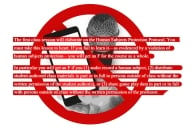You have /5 articles left.
Sign up for a free account or log in.
There is no First Amendment right for students to write of their physical feelings for their college instructors, a federal judge ruled Tuesday.
Joseph Corlett sued Oakland University, in Michigan, after he was suspended over a "Hot for Teacher" essay in his writing journal. In the essay, he quoted the Van Halen song and then goes on to talk of his affection for an instructor. He writes of her physical characteristics, and says that there's "no way I'll concentrate in class," when he can see "a sexy little mole on her upper lip beckoning...." In another entry, he says he is "not a maniac for every female," but that he tries to "find something attractive about everyone."
Corlett -- backed by the Foundation for Individual Rights in Education -- said that his First Amendment rights were violated after the university reacted to what his instructor found in the journal when he turned it in. He noted that students had been encouraged to be creative and write about whatever they wanted. (FIRE has posted Corlett's full journal entries here.)
But Judge Patrick J. Duggan rejected those claims. "When plaintiff referred to his Oakland University English professor as 'stacked' and graphically compared her to a sitcom character he fetishized in a writing assignment, he brought a pig into the parlor. Such expressions, while possibly appropriate in some settings, need not be tolerated by university officials."
Much of the legal maneuvering in the case concerned whether court rulings involving high schools (which generally grant administrators more control over student speech than do rulings about colleges) could apply. Judge Duggan said that some of the high school principles could apply. "While universities arguably may not bear the same responsibility as elementary and secondary schools to act in loco parentis," he wrote, "universities undoubtedly retain some responsibility to teach students proper professional behavior, in other words, to prepare students to behave and communicate properly in the workforce."
Judge Duggan said that if there is no clear First Amendment issue, courts should not second guess universities. And he rejected the idea that Corlett's speech should be viewed as covered by the First Amendment -- at least when made in an academic setting.
"Plaintiff’s expressions of lust for [his instructor] or descriptions of her physical appearance are not entitled to First Amendment protection," Judge Duggan said, citing a federal appeals court ruling that "self-expression is not to be equated to the expression of ideas or opinions and thus to participation in the intellectual marketplace."
Added the judge: "It matters not whether Plaintiff’s Daybook writings satisfied the legal definition of obscenity or sexual harassment. Defendants reasonably could have found his writings inappropriate from a student to a teacher (as they certainly would have been from a teacher to a student) and punished him accordingly. Perhaps some would view defendants’ punishment as disproportionate to plaintiff’s conduct. Perhaps, however, defendants believed the sanctions were necessary to emphasize to plaintiff that, although arguably acceptable in a karaoke bar, certain behaviors when directed at female professors, fellow students, or future co-workers are not tolerable in a civilized society. Nevertheless, defendants’ reasons for exacting the sanctions imposed on plaintiff are irrelevant, as the Court concludes that his First Amendment rights were not violated under the facts alleged."
FIRE issued a statement Tuesday night strongly condemning the decision. "The district court fails to recognize the critical differences between the grade school and collegiate settings, wrongly reducing the free speech rights of adult students to those of children," the decision said. "In holding that public colleges may ‘prepare students to behave and communicate properly’ at the expense of the First Amendment, the district court infantilizes adults and ignores the robust speech protections a modern liberal education requires."








